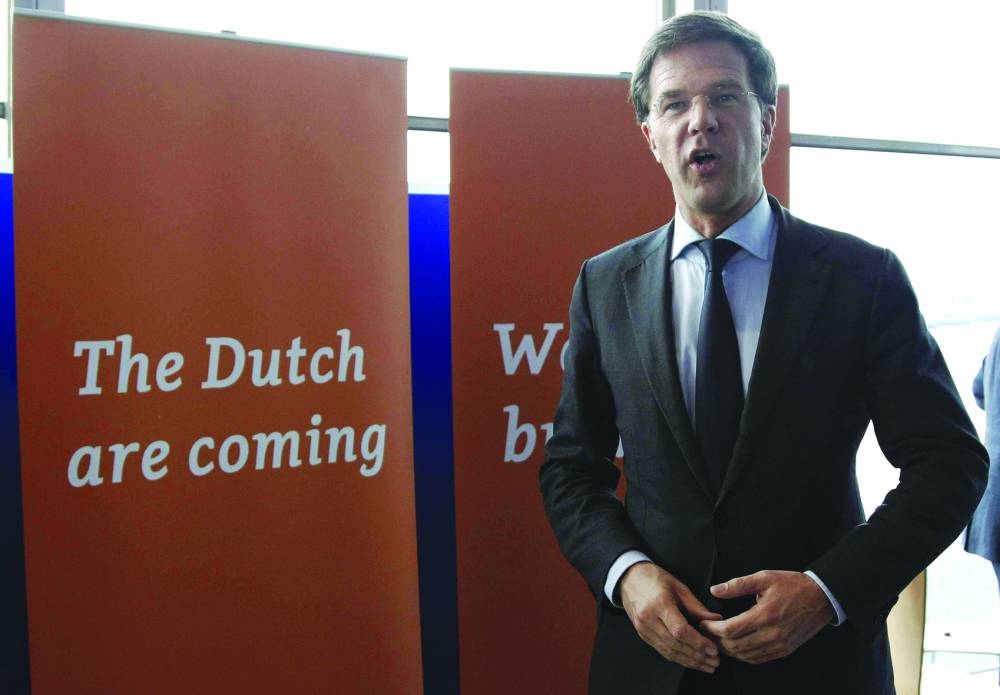The United States, Britain, France and Germany all backed outgoing Dutch Prime Minister Mark Rutte on Thursday to succeed Jens Stoltenberg as the head of the North Atlantic Treaty Organisation (Nato), putting him in a strong position to win the leadership of the transatlantic alliance.
Stoltenberg’s successor when he steps down in October will take office at a crucial juncture, tasked with sustaining Nato members’ support for Ukraine’s costly defence against Russia’s invasion while guarding against any escalation that would draw the alliance directly into a war with Moscow.
“President (Joe) Biden strongly endorses PM Rutte’s candidacy to be the next Secretary-General of Nato,” a US official said. “PM Rutte has a deep understanding of the importance of the alliance, is a natural leader and communicator, and his leadership would serve the Alliance well at this critical time.”
Depending on the outcome of November’s US presidential election, the next Nato boss may have to deal with a second term for Donald Trump, who drew fierce criticism from Western officials earlier this month for calling into question his commitment to defending Nato allies if re-elected.
Founded in 1949 to counter the Soviet Union during the Cold War, Nato is a political and military alliance of countries from North America and Europe.
Enshrined in Article 5 of its founding treaty is the principle of collective defence – the idea that an attack on one member is considered an attack on all.
Nato leaders are appointed by consensus, meaning all members must consent to a final decision.
The alliance currently has 31 members, with Sweden poised to join soon.
Diplomats say that Rutte is the only official candidate for the post in the behind-the-scenes contest, although some said the name of Romanian President Klaus Iohannis had also been floated in informal discussions recently.
However, with the support of Washington – the alliance’s predominant power – and the three big European nations and some 16 other Nato members, according to diplomats, Rutte is in a commanding position and any rival would face an uphill battle.
The Netherlands’ longest-serving leader, 57-year-old Rutte has had good relationships with various British, European Union and US leaders – including Trump – during his tenure.
At the weekend, Rutte urged European leaders to “stop moaning and whining and nagging” about Trump and focus instead on what they could do to bolster defence and help Ukraine.
Backing Rutte, the British Foreign Office said he was a well-respected figure across Nato with serious defence and security credentials, who would ensure it remained strong and prepared for any need to defend itself.
A senior French official said President Emmanuel Macron had been an early supporter of putting the Dutchman in the role, having sounded him out about the post last year.
A German government spokesperson said Rutte had Berlin’s backing, praising him as “an outstanding candidate”.
Still, one senior diplomat cautioned a deal had not yet been reached.
Poland – a growing military power in Europe – has no position yet, a foreign ministry spokesperson said.
There was also no word from Hungary and Turkiye, which are regarded as potential holdouts against Rutte by some diplomats.
Under Rutte’s leadership, Dutch defence spending was cut during years of fiscal austerity.
Since Russia’s invasion of Ukraine, however, the Netherlands has increased spending, taking them to around 2% of GDP in 2024.
Rutte has long been a fierce critic of Russian President Vladimir Putin.
Rutte announced his departure from Dutch politics in July, but remains in post as a caretaker leader while coalition negotiations continue following a November 22 election.
Stoltenberg, a former Norwegian prime minister, has served as Nato chief since 2014.
Estonian Prime Minister Kaja Kallas and Latvian Foreign Minister Krisjanis Karins have also signalled interest in Nato’s top job but have not been presented formally as candidates, diplomats say.

Mark Rutte
